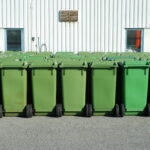Renewable Energy from Waste reports on Stop & Shop Supermarket’s Green Energy Facility in Freetown, Massachusetts, which opened April 15. The Green Energy Facility will accept wasted food from the 212 New England Stop & Shop stores and convert this food into energy. The Green Energy Facility estimates that 34,000 tons of inedible food can…
The Eagle Tribune published an Earth Day article by Martin Suuberg, Commissioner of the Massachusetts Department of Environmental Protection. Suuberg’s article highlights partnerships and collaborations to promote goals and creative solutions for environmental protection. He provides the example of Massachusetts Clean Energy Partnership for Drinking Water and Wastewater Treatment Facilities. This partnership includes the Greater…
Practice Greenhealth is hosting a five-part series, “Feed People, Not Landfills,” on reducing food waste in hospitals. Practice Greenhealth, a nonprofit membership organization, is a source for environmental solutions in the healthcare sector, including webinars, eLearning, and educational programs. The five webinars focus on food waste assessment, prevention, donation, and management in the health care…
The Environmental Council of the States (ECOS) recently featured the Massachusetts Commercial Organics Waste Ban in a Success Story Video. ECOS is an association that helps state agencies to improve human and environmental health in the US. Massachusetts is one of the first states in the nation to implement an organics disposal ban. The ban,…
GreenBiz reports a new collaboration to research and identify strategies for reducing food waste known as Rethink Food Waste through Economics and Data (RFED). ReFED is led by a group of businesses and foundations including Sodexo, Deloitte Consulting, MissionPoint Capital Partners, and the Closed Loop Fund. ReFED research has identified $165 billion in annual lost revenue in the…
In February, Food Engineering Magazine published an article on tactics that food and beverage manufacturers are taking to reduce waste. Food and beverage processors are using a wide variety of methods to reduce waste; these efforts help meet company’s sustainability goals while offseting manufacturing costs. The article includes some tips from RecyclingWorks for reducing waste.…
The Massachusetts Clean Energy Center (MassCEC) is accepting applications for the Commonwealth Organics-to-Energy Program. The funding supports technologies that convert source-separated organic waste into electricity, thermal energy, or compressed gas for vehicle fuel. Applications are currently being accepted for three types of projects: Implementation and Pilot Project Construction Funding. Due March 22. Feasibility Studies. Due…
MetroWest Daily News reports on a range of food waste reduction efforts going on across the MetroWest region. The Massachusetts Commercial Organics Waste Ban, which went into effect in October of 2014, has motivated increased interest in diverting surplus food and food scraps from landfills and incinerators. The article describes examples of businesses and institutions…
The Food Waste Reduction Alliance (FWRA) has created a Best Practices & Emerging Solutions Guide. FWRA is an initiative of the Food Marketing Institute, the Grocery Manufacturers Association, and the National Restaurant Association. FWRA has three main goals: To reduce the amount of food waste generated To increase the amount of surplus food that is…
WCAI Local NPR for the Cape, the Coast, and the Islands, reported on RecyclingWorks efforts to reduce food waste in conjunction with the Massachusetts Commercial Organics Waste Ban. The story is based on an interview with RecyclingWorks staff, Lorenzo Macaluso. Macaluso describes how RecyclingWorks helps businesses divert excess food through source reduction, donation, composting, and…

